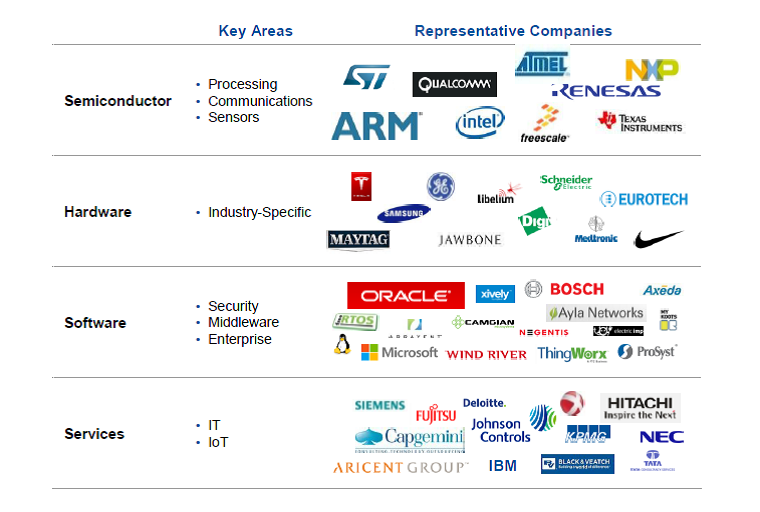Last week I attended a breakfast event on IoT organized by SEMI at their HQ in San Jose. There seems to be an IoT event every week in Silicon Valley right now but this one was just down the street from the new Avnet office where I’m based so hard to pass up. If you are following all things IoT then you know you can spend hours a day reading about it and the bandwagon gets bigger every day which explains why SEMI jumped aboard. SEMI is the industry group for semiconductor equipment manufacturers so very upstream of semiconductor companies and OEM’s who use chips in their products. I suppose SEMI sees IoT as huge end market opportunity that will eventually create demand for new fabs which will be filled by their members gear.
The speaker roster had someone from Applied Materials on it but the really interesting content came from Gartner, Synopsys and ARM who all have a lot to say about IoT.
Karen Bartleson had a big role in that she was speaking on behalf of the IEEE standards association and also her employer, Synopsys who will benefit from IoT as chipmakers need to buy more tools to design the silicon for IoT. Karen talked about the “Open Stand” process and how the standards sausage is made, she also noted there are currently 900 standards underway in the IEEE-SA which was many more than I imagined, to me a hundred would seem to be enough, clearly I need to take a deeper look at the world of standards. Karen said the IoT standard will be called IEEE2030 because that’s the year that the standard will be complete. At first I thought she was joking, but no, it really is called IEE2030, check out this standards set courtesy of the IEEE:
All joking aside, Karen raised an important issue which is when a new technology inflection point occurs (and I see the IoT as important as the PC and mobile eras) there is a period of turmoil and opportunity that changes the world forever. It’s in this primordial soup of technology evolution that fortunes are made and lost and why you should care about what’s going on in the world of IoT.
I started this blog in May of 2013 and kicked it off with my 7 essential elements of IoT success with standards being one of them but I didn’t realize at the time that standards would take so long.
So the big question has to be why will it take another 16 years to get a set of standards for the IoT?
Past experience is always a guide I suppose and the IEEE has been in the standards game for decades so they should know, but the other factor is the electronics industry itself and deep vested interests. The formation of new groups (Industrial Internet Consortium for example) to push collaboration and standards by Intel, Qualcomm, Microsoft, AT&T, GE etc. combined with the plethora (and I do mean plethora) of other standards bodies beyond the IEEE who have a hand in this (ITU, IPSO, SIA, UL, NIST etc..) could mean years of stalemate and argument with vested interests lobbying for an advantage. A great PhD project would be to look at how setting standards accelerated (or slowed) innovation. In Karen’s defense of the timeline the IoT extends well beyond the chip and the system to homes, cars, grids and cities where replacement and upgrades happen slowly so maybe 2030 is the right number.
At the session I got another gem from Al Velosa of Gartner who pointed out that no single company has a strong IoT ecosystem yet and this explains why many of the major players in technology are jockeying for position with their own consortia and alliances rather than waiting for the IEEE to make the sausage. Most large companies in and around technology see that billions of connected devices generating zettabytes of data will create revenue opportunities that dwarf their current businesses and they don’t want to be the next DEC, Wang, Nokia or Blackberry.
So if you want to really understand how the IoT will play out then watch the formation of ecosystems whether by alliances or mergers and acquisitions through 2014 (Zebra buying the Motorola bar code business yesterday is a great example). Here are the 4 areas of ecosystems development that need to connect as defined by Gartner:
It’s fairly easy to see who has the deepest pockets but it’s also noteworthy that a lot of the new companies in IoT are crowd funded startups; something I have written about before and strongly believe will bring us some new dominant players over time. Many crowd funded startups lean heavily on open source hardware and software and this in itself may be way the IoT brings about standards much faster than the tortuous IEEE route. Open source levels the playing field for everyone and that’s not necessarily embraced by the incumbents in a market (think Apple and Android for a defining example).
So here’s a hypothesis to end with; does a large thriving ecosystem negate the need for standards? This happened in the PC market and to some extent in the mobile phone market. Can we wait until 2030 for a set of standards to rally around?


Comments
Post a Comment